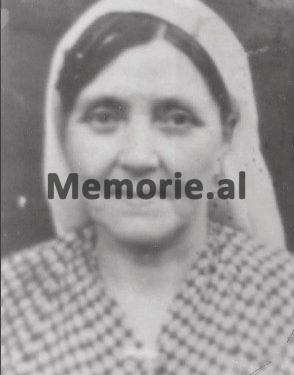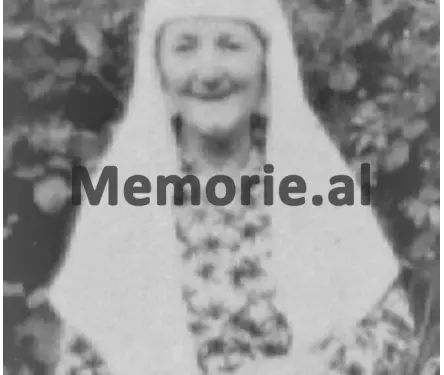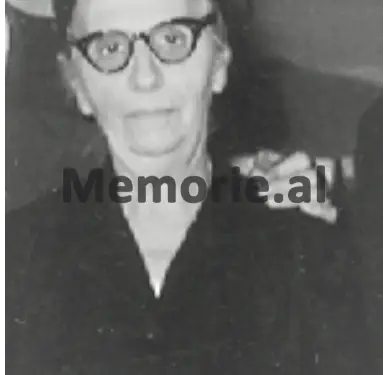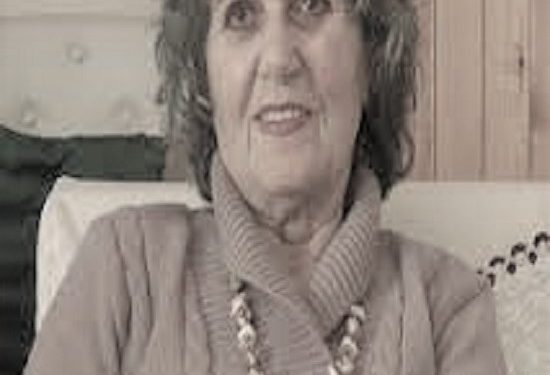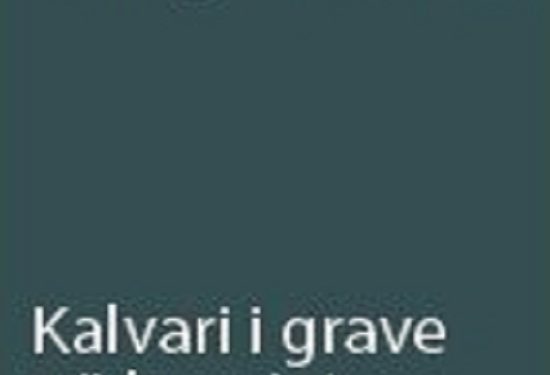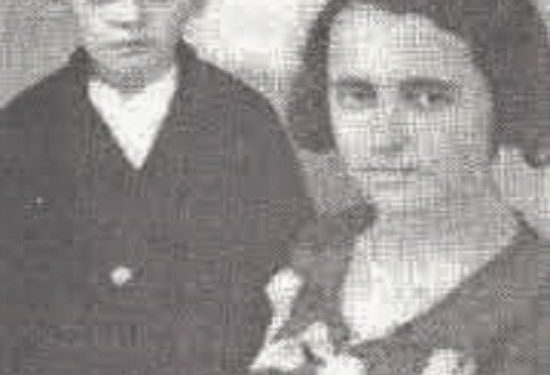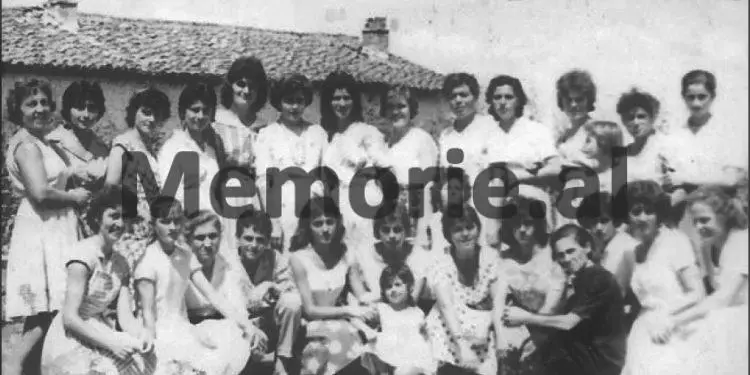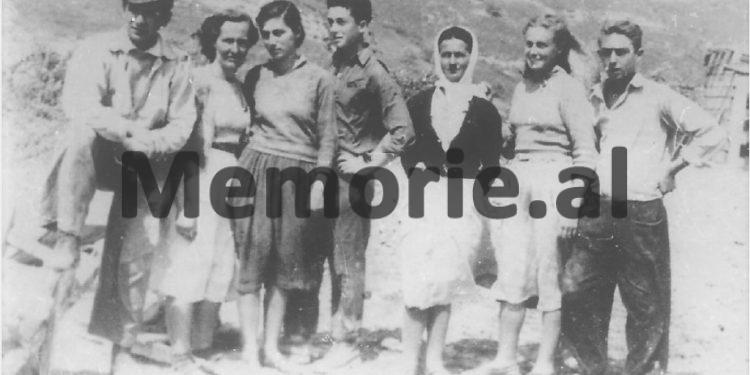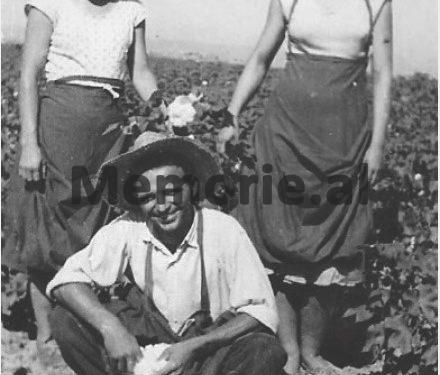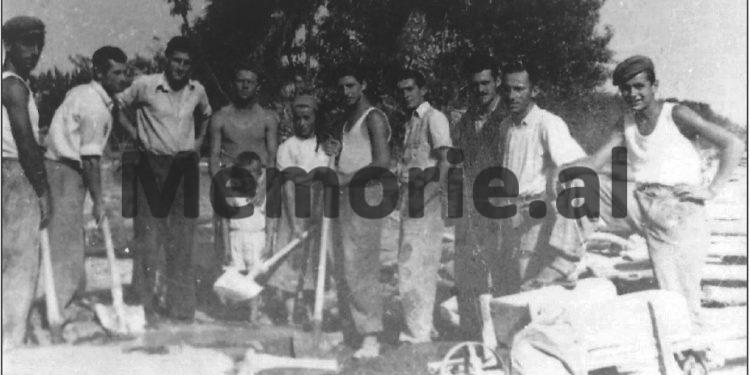Fatbardha Mulleti (Saraçi)
Part seven
Memorie.al publishes some parts from the book ‘Calvary of women in communist prisons’, by Fatbardha Mulleti Saraçi, (granddaughter of the famous former mayor of Tirana, Qazim Mulleti), whose family from 1944 until in 1991, he was persecuted by the communist regime of Enver Hoxha, where Fatbardha’s father, Haki Mulleti, a former senior state administration official since the 1920s, was imprisoned and interned by his family, until died in the hospital of Tirana, poisoned by the State Security. In her book ‘The Calvary of Women in Communist Prisons’, which is the fruit of several years of work, the author has masterfully described the unknown stories of some of the Albanian women and girls who suffered in prisons and internments in the dictatorial regime of Enver Hoxha, started by her mother, Pertefe Mulleti, and in turn: Marie Deda, Hajrie Kazazi, Kushe Seknej, Mrike Pali, Zyliha Rusi, Roza Jakova, Fatime Dilaveri, Hatixhe Pipa, Marije Gjoka, Angjelina Topalli, Hatixhe Kopliku, Nafije Kop Bushati, Budije Bushati, Adile Kazazi, Antonela Dostanishta, Nafije Stërmasi, Luçije Saraçi, Adile Meta, Qeuthere Meta, Feride Damnori, Vitore Ashta, Fetije Vuçiterni, Zehnije Gjylbegu, Xhyhere Kazazi, Luçije Malaj, Leadije Kazazi, Sadije Kazazi Hava Repishti, Luçije Kurti, Rukije Bushati, Shaqe Logoreci, Qamile Myftija, Marie Ndokëllia, Rozë Çefa, Çile Staku, Shaqe Marku, Lajde Arapi, Lutfije Barbullushi, Syme Muka, Zenepe Kraja, Fahrije Kazazi, Naxhije Plari, , Lizë Vukeli, Bade Kjaraj, Hava Baçi, Xhehadire Boriçi, Vitore Kalaj, Katerina Benusi, Sofije Baja, Lenë Pjetri, Dava Markagjoni, Mrika Markagjoni, Marta Gjonmarkaj, Bardha Gjon Markagjoni, Kristina Gjomarkaj, Çelestina Pervizarki, Kune Miraka, Sultana Dine, Vera Dine, Agime Dine, Hamide Çela, Vera Dine, Kadrije Cami, Sanije Sulaj, Meliha Sulaj, Vashe Kola, Prena Llesh Gjeçi, Gjystina Seku, Ilda Melgusha, Agime Pipa (Aranitasi), Terezina Pali, Liza Pali, Adile Boletini, Nasibe Kazazi, Ana Daja, Dila Zef Ndoja, Zyraka Mano, Shanisha Dosti, Zojë Gjeloshi, Drane Stakja, Elena Luli, Sabiha Kasimati, Marije Deda, Marije Shllaku, Biçe Pistulli, Sadije Kazazi, Gjyzepina Çoba, Marta Doda , Frida Satedini, Vitore Kuka, Gjela Llesh Biba, Bardha Cub Marku, Liza Llesh Mali, Bardha Mark Bushkola, Marije Tuci, Olimbi Baruti, Angje Kovaçi, Bedrije Ashikja, Musine Kokalari, Motër Gjeorgjina, Liljana Radovani, Laura Keqi, M Mrike Zadeja, Angjelina Shantoja, Naime Koçi, Sheriar Sefa, Vitore Shllaku, Liza Gjon Voci, Nina Shiroka, Laje Mehmeti (RRema), Feride Beshiri (Quku), Hasije Ulqinaku (Quku), Sofije Kali, Çile Gjush Larja, Nurfezo Koprencka, Sanije Gjylbegu, Emilja Shest Bregu, Vida Radovani, Nedrete Pipa, Motrat e Osman Kazazi, Safete Jusif Sokoli, Çiljeta Simoni, Lutfije Buashati, Sadije Bushati, Olga Schëeizer Libohova, Evelina e Ndoc Naraçi, Geraldina Apony-Zogu, Hilda Zyma. Marie Rafael, Zade Muka, Rukije Bushati, Hajrie Vrioni, Emine Gjyrezi, Xhemile Beqir Komi, Hedije Dume Repishti, Syme Muka, Fetije Vuçiterni, Sebije Puka, Marjeta Serreqi, Dhurata Sokoli, Klara Miraka (Merlika), Asi , Liri Cenaj, Rudina Dema, Adelajde Miraka, Drane Jakja, Syriha Hasi, Aishe Gogaj, Luçija Kaçaj, Gjyljana Malaj (Pervizi), Nadide Kasaruho, Nadire Kërçiku (Peshkëpia), Shpresa Ballolli (Merdani), Makbule Frashëri, Misly Çrash Dervishi (Leka), Natali Arkandi Rozengolc (Pengili), Vigelmina Vitalij Kovaleshko (Veshi), Rukije Rama, Tefta Tasi, Liri Lubonja, Kozara Kati, Shpresa Ngjela, Vera Bekteshi, etc.
Continued from the previous issue
Zade Muka and Pertefe Mulleti
(1896 – 1965) (1915 – 2000)
When she was 60 years old, her granddaughter with the gas of her first youth, had asked her: “Why do you even look at the old man, your cheeks are red and you are still beautiful”?! She replied with a laugh: “- I am a girl from Ulcinj, they raised her with olive oil.” He was born in Ulcinj a century ago and married Ramazan Muka in Shkodra. 18 children were born, of whom 6 lived (one son and five daughters). She was a tall woman with a round face. His brown hair surrounded him like a crown. Her family was filled with the gas of children, gas that was cut off with the arrival of the Slavo-Communists. The city, under siege, was filled with prisons, and women dressed in black. Based on diligently compiled lists, partisan teams exercised successive checks. I better say they combed the gloomy city several times.
In these conditions, Nana Zade sheltered in her house the nephew of the house, Sheuqet Muka and the son-in-law of this house Sali Vuçiterni, so that both nationalists would know, this action is very dangerous for the time.
Every time there was a knock on the courtyard door, the two men entered the shelter and prepared it very carefully, which was nothing more than a cavity between the vault of the house (the stone arch of the lower cot door and the floor of the living room) reception. After this action, one of the girls came out to open the door, while Nana Zade and the other girls stood straight, as if reluctant, almost ready; because they knew that the police would enter.
Were accustomed to these controls. No muscle in their face should move no sign of weakness should be given; the guards had to understand nothing, then. (Let’s not forget that they were housewives aged 20 and under). Their heart knew how much it was beating, until the control was over. How many sleepless nights did they spend guarding? How many times did they hide the compromising items, for two years, (December 1944-October 1946). “Our hearts trembled, even when the poplar leaf was moving,” said one of them. “When Jup Kazazi and Seit Kazazi were killed, to take refuge near us – another continues – we were terrified, because we knew that with us, it would happen as well.” In these critical moments, Nana Zade and her daughters also had the pain of the son of the house, Zija, whom the Albanian communists handed over to those Yugoslavs. The trial took place in Prishtina and he was sentenced to 7 years in prison, which he served in the Nis prison. No way to help her. No news from him.
Everything in the house was looted. The family was held hostage to the seizure of valuable books, among them the collection of “Fjamur” by Jeronim De Rada Arber. And when, at last, the boy would come free, the blessed mother said to him: on her chest. “Only these, the communists could not take me.” Nana Zade did not know that the boy, Haki Tahja, had been shot by Serbs because he had killed Miladin Popovic.
Nana Zade, in her youth had experienced the death of her three brothers, as well as a sister, but was more injured by the untimely death of her granddaughter, Sabahet (Donika) Mullet. She came from Kavaja, where there was no high school, she attended Pedagogy in Shkodra. Every time she came home with tears in her eyes that she was mistreated by the directorate or the communist youth: they asked her to deny that she was Qazim Mulleti’s granddaughter, but she kept saying: “I have been, I am and I will always be his granddaughter”. From suffering, he fell ill. Medicines for him were not found and as soon as he entered the matura, he died. It was the time when the song “Luleborë” started to be sung. And she was like that.
The years passed and the mother and daughters were already working, to keep, now in Albania, the boy who was still in prison. Nana Zade had lovers especially for her numerous grandchildren. He also took with him Bardha, Sabahet’s sister.
And she did not have the opportunity to attend high school in Kavaja, so she did it next to her grandmothers. She and her aunts are still very grateful for this great humanitarian gesture. While she was looking forward to the boy’s release, in 1965 she died, staring at the wall where his portrait hung.
In many of the girls living in Shkodra, fate befell them late (one did not marry), in Tirana, Mother Zade’s eldest daughter, Përtefi, was married in 1932 to Haki Reshit Mulleti, an old and patriotic family.
She had 4 daughters and a son, Tartushin, the newborn, when her husband was arrested. In the memory of these girls is still left and will not be erased a moment of their lives. The State Security had called their mother to the investigator. The 3-month-old baby was left at home. Why did the desolate woman say to them, “Let me go, because the boy has time to eat?” The red criminals did not care. When the girls returned from school (the oldest 12 years old), they found their brother crying. Near the cradle was stuck the house dog (Luli) who was guarding. With his cries, he led the poor girls, holding the baby in their arms, towards the investigation. There is no pen to describe the scene that took place there; nana in the dungeon and across the street five children eagerly awaiting her.
Perhaps it is superfluous to recall the robbery that was done to the family from the process of confiscation of property. The burden fell on Pertef to support the family. How hard it was. Every time she went to meet her husband in prison she would also take the children. Imagine a few months old baby crossing the prison bars to hug his father, or in other words, two hands reaching out from inside the bars and pulling a baby to look at a man he still does not know. The gifts his father gave him (rings made of peach kernels) were kept by the children as the most precious things. After prison they were interned in Kavaja. Two tired and sick parents, who worked very hard to support their five children,.
Five children, schoolchildren who experienced creepy scenes, which killed their sleep: they were taught to see there people hanging on the berry branches, so, with their tongues sticking out, they swayed in the wind. The white sheet that covered them and the plates with the written words were crooked “enemy”. Or, to be shot, exposed in the school yard. The red terror was on its feet. The children grew up slowly. Before going to sleep, under the guidance of their father, they would pray: “Lord, protect our country from the enemies of the nation … protect our mother and father, brother and sisters, relatives of the whole tribe.”
The sorrows and sorrows were endless. A girl (Donika, or Sabaheti) dies in Shkodra. Baba is called several times to the Department of Internal Affairs to become a spy, and since he refuses, a way (injection) is found in the hospital of Tirana, to eliminate him. It is written, as if to bury a family, the comedy “Prefect” and people, not all, point the finger at them. As in one hut, in the other. Sometimes with bread and sometimes without it. Aunt without end. Finally, the family moved to Shkodra and grew up in the midst of the love and warmth of the Muka family, where Nana Zadja stood out.
Hava Repishti
(1898 – 1980)
It was unfortunate for her to remain a widow at the age of 45. As well as for the 6 children who were left without their father, Ibrahim Repishti, one of the promoters of the Democratic Movement in the period of Independence. What would happen later?
The tragedy, in the first act would have been the arrest and inhuman torture of the eldest son, Sami. They would not “forget” this and bury him alive, to force him to submit to dictatorship. The bloody clothes were not enough, she would wash them with tears, but she would also be kicked by the prison guards every time she herself. She would eventually be present at the trial. The 22-year-old boy would be sentenced to 15 years in prison. He also heard the hysterical cries of some who mentioned the rope. With a broken heart, with children around him, he would crawl home. Suffering would follow suffering.
The other boy, Fahriu, would also escape. For the part of the family that remained, the exile that had lasted for three years in the castle of Berat and in the camp of Tepelena had already been determined. With her own eyes, she saw how many human lives were shattered like newly opened buds. He experienced tragic events, which cannot be imagined. How many young fairies were drowned, how many noble souls were no longer alive. In Tepelena, 200 people “lived” in a shed. “I was privileged,” she would recall, “that I had a kerosene lamp. There were Mirdita mothers, who asked me that night, to see if they had their babies alive..! A mountain bride, beautiful as light, her three children died there and she was left alone, the only cuckoo. ”
In 1953 he returned to Shkodra and “settled” in the basements, after everything else was confiscated. Now he had to work to survive, as well as help his imprisoned son. With the bag on her back, she knew how he got to the prison doors at Ura Vajgurore, where he was. That night in December 1953, she would never forget him, as her son does not forget today, perhaps even that ignorant guard, if he were alive, who performed the service that night. It was left behind the door for 24 consecutive hours. The rain that fell turned to snow at night. The next day, those present saw how an ice statue had been created: it was she who had “embraced” the bag of food and belongings. They remembered him dead. They said to the boy, “Nana, you are cold from the cold.” But she, perhaps from her warm heart, escaped. He managed to meet the boy. Tears of longing, words of hope, tears, courage … He did not forget until he died.
After his release from prison, he escaped. He knew he would be annihilated here. The burden of persecution was no longer shared. How many times her heart trembled from these sufferings, from misery, from misery, but everyone also knows, how dignified she was and how proud of the children she had raised. He hoped that one day he would meet her. “I even forgot their faces,” he sometimes said. Communism lasted a long time in Albania and she died with a broken heart without realizing this last wish.
Luçije Kurti
(1896 – 1976)
She was born in Skopje and was the only daughter of Kole Gjini from Shkodra. She married in that city Zef Palokë Kurti, who was the son of the leader of the first music band of Shkodra and who served as a teacher of the Albanian language. This happened in 1915. After two years, for his patriotic activity, the latter was exiled to Austria, leaving only his first wife and son, Nino. After his return, she also became the mother of Biçe, Kola, Paloka.
World War II had begun. One of the most prominent nationalists of that time was her brother-in-law, Lec Kurti, who led the ‘Balli Kombëtar’ organization in Shkodra. The boys of Lucija were also of this current, who also helped in the escape of Mithat Frashëri. This is where the troubles for Lucia begin; her son, Kola, nearly died of typhus in 1945 and it was her care that saved her. A year later, his eldest son, Nino, was arrested and sentenced to 30 years (reduced to 15 years) to serve in Burrell Prison. In the same year, after the Postriba Movement (1946), Kola was arrested, who, after being sentenced to 10 years for working in Beden, Lekaj and Çengelaj, was sentenced to 7 years in exile in Çervin, Levan and Shtylla. Meanwhile, the little boy, Paloka, was sent as a soldier to labor units, which were very similar to prisons or labor camps. This was not enough for the Albanian State Security. In 1951, Bichen was also arrested because, in the by-elections, she had thrown the grain in the empty box (i.e. in the anti-communist one). After 6 months, the investigator was sentenced to 2 years’ probation, and her husband to 12 years in prison. A family of ours in prison. 48 years for honorable, cultured and above all, innocent people. Their only “fault” was that they thought in their head and not with the cliché offered by the communists.
Who would take care of them besides the parent? When her husband was heartbroken, the whole burden fell on Mother Lucien. Where to distribute first? At home, to serve the sick husband or the children who were scattered in the black prisons? More roads than home. As for one boy, for the other. In 1952, when her husband died, she did not happen to be at home and arrived only at the time of burial. As for all those women who fell the heavy burden of caring for the people of their heart, who struggled in prisons, she too sacrificed everything for their benefit. She sold everything, got tired and broke up, but brought to her children, in addition to the food they needed, what they needed most, her boundless love.
It was not said that with the release of the boys, to fall into silence. Her nephew, Ndoka, who was widely spoken to by the people after being fired, is understood for biographical reasons, dies at a young age. He died soon afterwards himself. Even when the dictatorship was in its last throes, for participating in the demonstration of January 14, 1991, the bride and her son and granddaughter were mistreated by the security forces. Thankfully, she herself did not experience these moments, these last sufferings of her trunk shoots. Memorie.al




